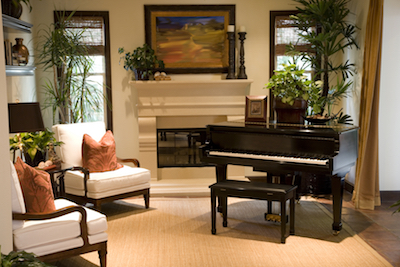Buying a piano without considering the final room placement is similar to buying an expensive home theater and expecting quality sound in any room in the home.
It’s not going to happen.
Because sound is dependent upon acoustics, defined as the properties or qualities of a room that determine how the sound is transmitted to it. 
Every room has an invisible foe; acoustic distortions that impact the sound quality in the room. They distort the sound you’re trying to hear by covering it up with other sounds already a part of the space.
Sound bounces. It’s not a one-time impact. Any time you produce a sound, it reflects based on the direction of the sound produced and what materials it finds in the process.
Place a grand piano with the lid opening to the wall. Now change it and have it opened to the center of the room. Hear the difference?
Everything in the room, everything in your piano’s surrounding area impacts the final sound produced. It filters it. It masks the details. It either creates clarity or mashes it up.
In the ideal world, your goal is to make the acoustics disappear, so that you’re only hearing the pure sound coming from your piano. Of course, you wouldn’t be able to create that room in reality; different frequencies always come into play.
But critical listening is a part of good placement. And that means every aspect of your room – floor, walls, ceiling – all have an impact on the final sounds you hear.
Music studios work meticulously to create the right environment so perfect sound is the norm. They invest heavily in creating perfect balance: absorption, diffusion, and reverberation. This means covering all surface areas with the right amount of treatments and absorbers to create the perfect sound every time.
Luckily, if your goal is to play and not to record, you have a little more leeway in the sound produced.
Realize everything in your room impacts the end sound. Add a rug, and you’ll reduce volume. Add wall hangings, and you’ll change the voice.
Also, remember that the “right” sound isn’t the same for everyone. Your ear is key. What sound the best for you?
The better it sounds, the more you’ll play. And ultimately that’s what matters most.

